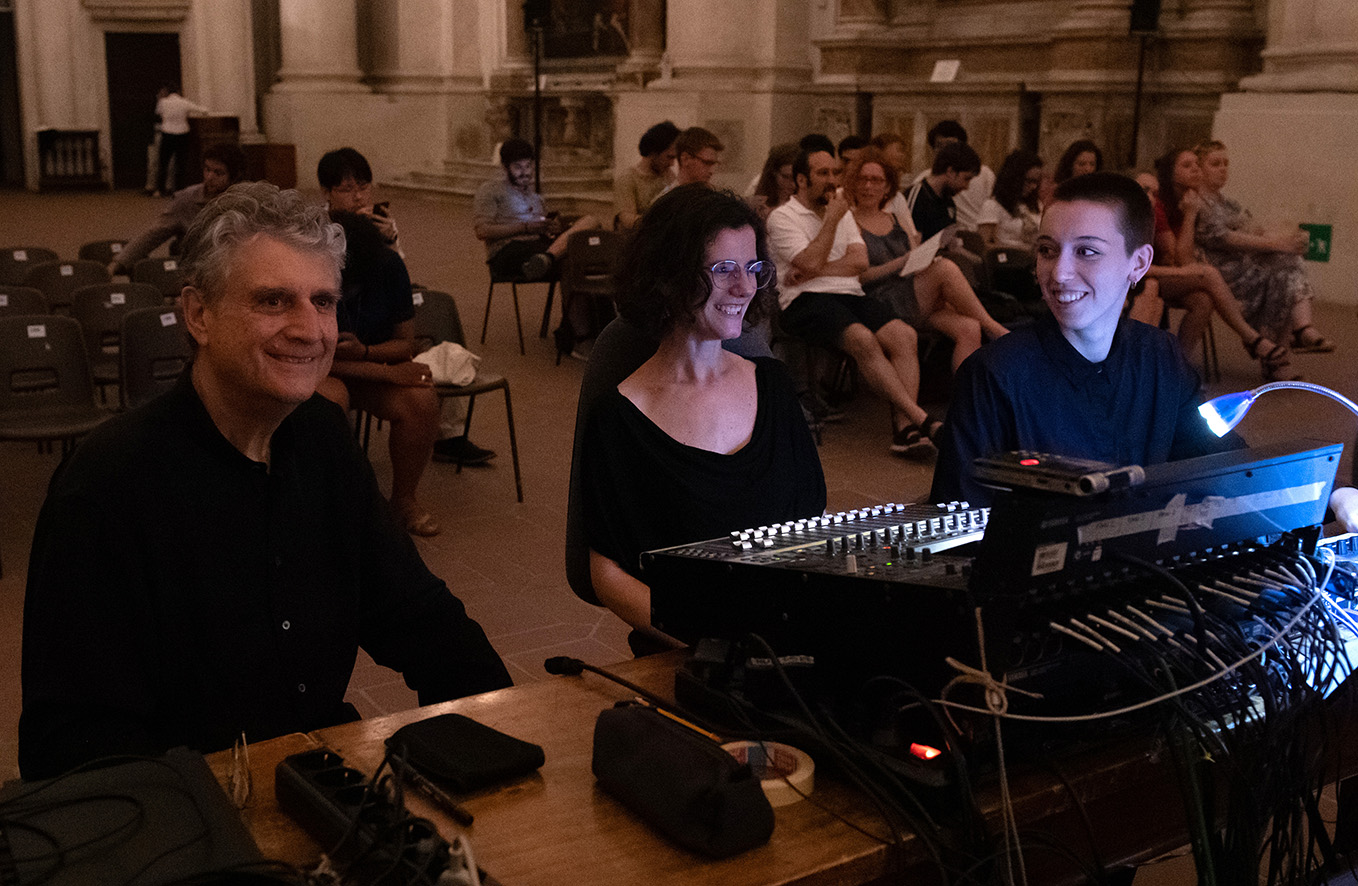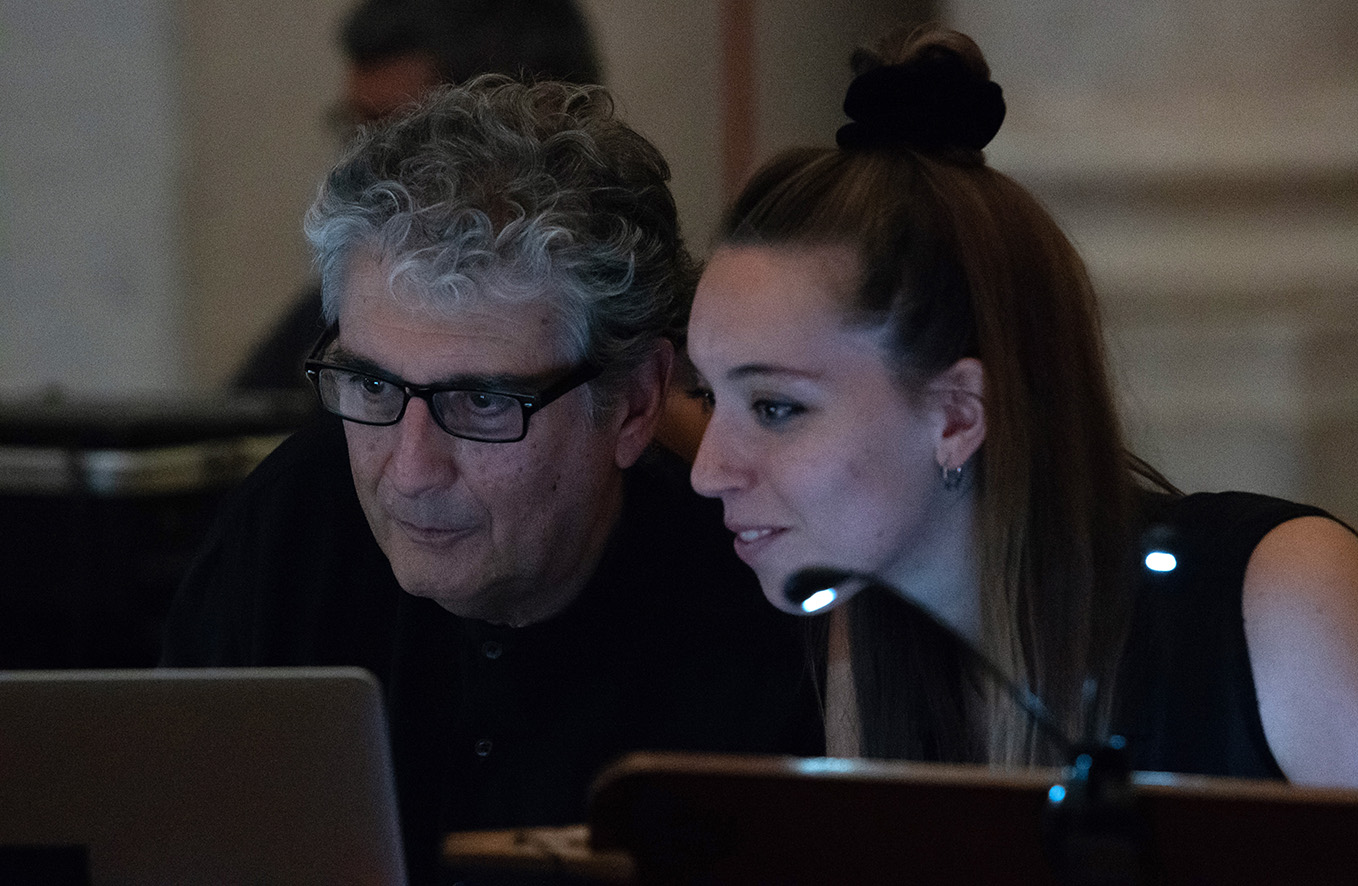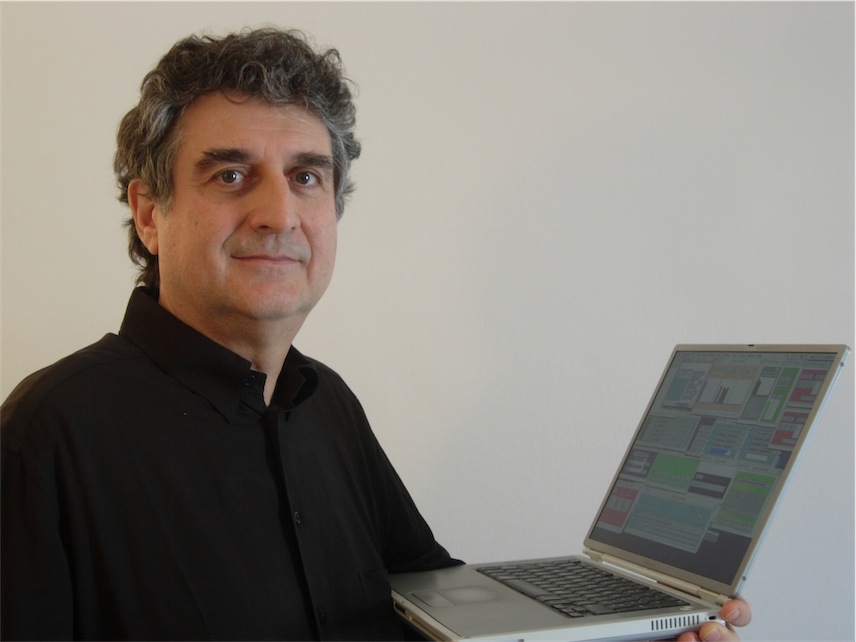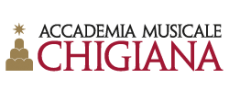This post is also available in:
 Italiano (Italian)
Italiano (Italian)
ALVISE VIDOLIN instructor
NICOLA BERNARDINI co-instructor
20 JULY / 31 JULY

GENERAL INFORMATION
This seminar is directed toward composers, performers, and interpreters of electronic music, and to sound engineers eager to deepen their understanding of the theoretical elements, techniques, and creative abilities related to the realisation of live electronic concerts. The on-line lessons will prepare participants for the in-person seminar and will take place from 10.00-13.00 / 15.00-18.00 on the following days: May 13, 20, 27; and June 3, 10, 17, 24 and 8 July.
It is possible to attend the seminar as an auditor. A limited number of auditors will be accepted.
The seminar will be divided into daily individual lessons alternating with collective/individual workshop meetings.
Students admitted to the course may participate in the rehearsals and performances of these works provided they indicate that they wish to do so on the application form.
1. COMPOSITION TRACK
For the entrance examination, candidates must submit the scores of two recent compositions with parts for electronic music, which must be received by April 28, along with the application form and the registration-exam fee.
The Chigiana Academy will communicate to all candidates the outcome of the selection made by the examining commission.
The seminar will have an analytical / theoretical character in the on-line and laboratory lessons with daily meetings in the on-site lessons.
By the first day of the online lessons (May 13), active students are required to present scores (or the draft of a score) of an original composition with live electronics for a soloist or small ensemble (voice, clarinet, cello, or double bass), the electronics portion of which will be realized during the course and performed in concert (July 31st) by a student of the Accademia Chigiana.
2. PERFORMANCE TRACK
For the entrance exam, candidates must present the technical-performance plans for two pieces from the repertoire for voice or instrument or ensemble and live electronics by a well-known author, to be chosen by each candidate. These must be sent with the application form by April 28.
The technical-performance plans must be finalized for performance in a hall of roughly 250 seats and approximate dimensions of m. 50 x 10 x 5(h), with live electronics preferably to be performed by a single person.
To perform the work, the candidate may make use, as necessary, of components from the following audio system:
- 9 independent amplification channels with 9 full-range loudspeakers positioned on the boom at variable height and orientation;
- 1 subwoofer speaker positioned on the ground with independent amplification channel;
- wide variety of dynamic condenser, proximity, radio, microphones with rods and various supports;
- 1 analog or digital mixer of the candidate’s choice;
- 1 reverb generator of the candidate’s choice;
- 1 personal computer with multichannel audio interface and MIDI controller of the candidate’s choice, software chosen by the candidate (preferred: Max / MSP, PD, Supercollider, Csound, or Faust, which may also be interconnected with each other)
- power supply, audio and power cables, technician for installation support.
The plan must include:
- data sheet;
- diagram of the connections between the various devices and their location in the Hall and/or in neighboring environments;
- detailed configuration of the mixer (inputs/outputs, internal programming);
- performance environment created by the computer using the chosen software;
- text describing the actions that the performer must perform during the performance, possibly accompanied by additional instructions inserted in the score.
SEMINAR DETAILS
Lessons on theory will deepen the student’s knowledge of the following topics:
– the temporal eco-sustainability of musical works with electronic parts
– the choice of technological equipment suitable for sustainability
– the adaptation of past works made with technologies that are no longer available
– the various semiographic notations useful for the reading, interpretation and reconstruction of electronic parts
– the use of scripting and automation systems for the systematic creation of highly complex electronic scores
These topics present challenging aspects that are still open to emerging research and will be addressed by highlighting the research and investigating the know-how and components necessary for in-depth realizations of past and future works.
LESSONS AND WORKSHOPS
IN-PERSON SEMINAR
The practical lessons provide for the active participation of students in the performance of the electronic parts of the compositions listed below that will be performed within the concerts of the Chigiana International Festival & Summer Academy 2022:
Gianvincenzo Cresta
Lo sconosciuto ritrovato (22 luglio)
Luigi Nono
Guai ai gelidi mostri (22 July)
Omaggio a Emilio Vedova (22 July)
Con Luigi Dallapiccola (27 July)
… sofferte onde serene … (31 July)
Salvatore Sciarrino
Cantare con silenzio (27 July)
Marco Stroppa
Traiettoria (31 July)
Martino Traversa
Bianco ma non troppo (27 July)
ONLINE PREPARATORY LESSONS
In the on-line preparatory lessons, the works with electronic parts to be performed in the aforementioned concerts will be analyzed and the executive environments planned. In the on-site laboratories, in addition to the execution of the electronic parts, the problems of recording, processing and spatialization of live sounds will be addressed, also as a function of documentation work to be carried out in post production. Through the preparation, rehearsal and performance of the pieces with electronics listed above, different playing techniques will be studied, using the SaMPL electroacoustic system based on d & b audiotechnik amplification, Yamaha DM1000 digital mixer and multi-channel spatialization in 8-channels.
The Chigiana International Festival & Summer Academy 2022 includes other concerts with live electronics performances that will be analyzed in the online lessons. In particular: Adriano Guarnieri, Traumnovelle (Ricordo di un sogno) (14 July) / Luigi Nono, Quando stanno morendo. Diario polacco n. 2 (14 July); A Pierre. Dell’azzurro silenzio, Inquietum (14 July); Ricorda cosa ti hanno fatto in Auschwitz (19 July); La fabbrica illuminata (19 July); Das atmende Klarsein (19 July).
In collaboration with SaMPL (Conservatory C. Pollini di Padova) and with the Center of Computational Sonology (CSC) of the University of Padova.
AGE LIMIT
35 years
ADMISSION
Requested materials to be included in the online application
TUITION & FEES
– APPLICATION FEE must be sent to the Accademia Chigiana WHEN YOU SUBMIT THE APPLICATION!
– Course tuition / ATTENDANCE FEE should be paid only after receiving an acceptance letter from the Accademia to the course or seminar
APPLICATION DEADLINE
28 APRIL
ONLINE LESSONS BEGIN
13 MAY
IN-PERSON SEMINAR BEGINS
20 JULY


COURSES
SEMINARS
BAROQUE PROGRAM
Last updated: 26/04/2022

